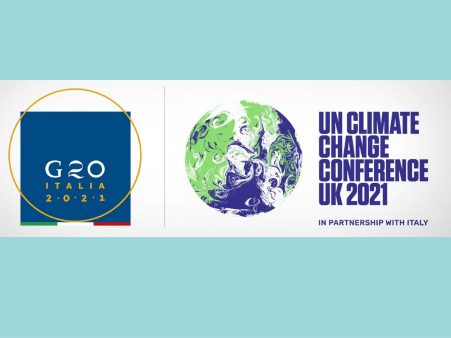Published in the Common Interests Newsletter – November 2021
Two major international meetings happened over the past few weeks: the G-20, the international forum that brings together the world’s major economies, met in Rome over October 30 & 31. This meeting was immediately followed by the COP26 Climate Summit in Glasgow.
Here are a few highlights from both.

G-20 Summit
Leaders of the Group of 20 countries haggled for two days in Rome over steps to tackle climate change and a pandemic recovery that is diverging between rich and poor countries.
G-20 negotiators labored to bridge the gap between a push for a tougher climate stance from European countries going into the 13-day Glasgow conference and concerns from China, India and Russia, where fossil fuels and coal play a major role.
The summit arrived at compromise wording for when G-20 nations need to reach net-zero greenhouse gas emissions. The Group of Seven richest democracies has set 2050 as the latest date, but leaders of the larger G-20 forum settled on “by or around mid-century”. China, Saudi Arabia and Russia have set 2060 as their goal for reaching carbon neutrality. A sad development.
The Group of 20 concurred that the impacts of climate change, such as extreme storms, floods and rising sea levels, will be “much lower” if the average increase in global temperature can be held to 1.5 degrees Celsius.
The leaders also said they would keep working on a French initiative for wealthier countries to re-channel $100 billion in financial support to needier countries in Africa to aid increased carbon sequestration and decreased greenhouse gas generation.

COP26 Climate Change Conference
In a report published midway through the climate summit, an independent research group, Climate Action Tracker (CAT) said the targets for 2030 remain “totally inadequate.” The report warns that even with current 2030 targets, global temperatures are on track to rise by 2.4 degrees Celsius by the end of the century, well above the 1.5 degree Celsius target for global warming set out in the 2015 Paris Agreement. CAT said that there is a “massive credibility, action and commitment gap that casts a long and dark shadow of doubt over the net zero goals” put forward by many countries.
Youth activists on the frontlines of the climate crisis came to the Summit to push for an end to inaction, urging politicians and business leaders to do all they can to meet the crucial goal of capping global heating to 1.5 degrees Celsius.
Tens of thousands of protesters marched through the rainy streets of Glasgow over the weekend to demand the urgent measures necessary to tackle the climate emergency.
Looking through the eyes of an optimist, our youth and our future leaders, are very interested and active in what is happening to our planet and are paying attention to the ramifications of inaction. Looking through the eyes of a pessimist: must we, and should we, rely on politicians to get this done?


